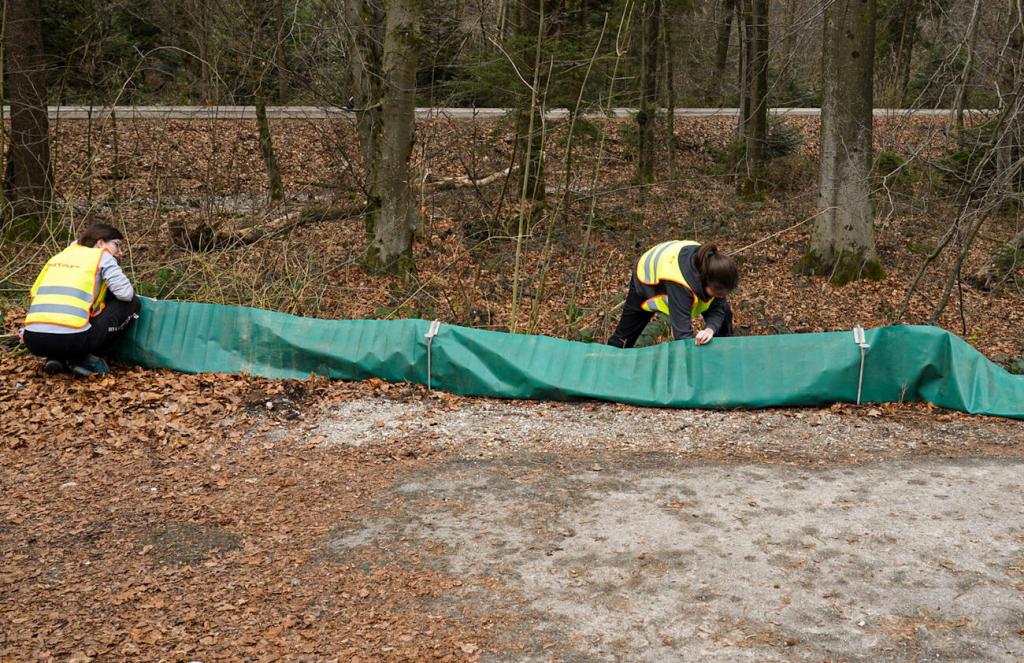Thessaloniki gets ready for its metro launch in November
The underground rapid transit lines have been under construction for almost two decades due to various project delays
 TheMayor.EU logo
TheMayor.EU logo 
Volunteers installing the amphibian protective fence in Ljubljana park, Source: Ljubljana Municipality/ Luka Sparl
The local Herpetological Society gets involved each spring
It’s spring and amphibian mating season is clearly upon us. Many people might not even be aware of that fact, however, a growing number of European cities are showing concern for the well-being of their smaller wildlife residents, too.
In the case of the Slovenian capital, Ljubljana, there is a volunteer society called the Herpetological Society - Societas herpetologica slovenica, which has devised a way to protect frogs and other amphibians during their migration journeys to the spawning grounds. The Society has been delivering this service for the past 14 years.
Members of the Society have erected a protective fence on the most critical section of the so-called Eternal Path (located at the Ljubljana Zoo), which makes it difficult for amphibians to cross the road. Volunteers count the amphibians who had gathered at the fence every night and then transfer them to the forest on the other side of the road, where there are several potentially suitable spawning grounds.
The first high temperatures and precipitations encourage the frogs to embark upon their annual journey to spawning grounds, where laying and fertilizing of eggs takes place in puddles, ponds and other suitable water bodies. Along this migration, amphibians often have to cross roads and other paths used by humans and that, unfortunately, can be fatal to them.
In this area alone, an average of between 2,000 and 4,000 amphibians are transmitted each year, the record was set in 2015 - with as many as 4,500 specimens. According to the Herpetological Society, most of these are toads (at about 90%), followed by brown frogs.
Through measures for the protection of amphibians, the volunteers contribute to the greater survival of these animals. And in case you’re wondering why this might be important to the city, frogs and other amphibians pay back the favour come summertime. Brown frogs, for example, feed on mosquito larvae, thus reducing the occurrence of these biting insects in the summer evenings.
The City of Ljubljana has also installed traffic signs along the Eternal Path and also along a bike path in the area that warn users to slow down and watch out for the frogs.

The underground rapid transit lines have been under construction for almost two decades due to various project delays

Now you can get your wine in Talence by paying directly in Bitcoin

That’s because the state has to spend money on updating the railway infrastructure rather than subsidizing the cost of the popular pass

Rethinking renewable energy sources for the urban landscape

The examples, compiled by Beyond Fossil Fuels, can inform and inspire communities and entrepreneurs that still feel trepidation at the prospect of energy transition

Now you can get your wine in Talence by paying directly in Bitcoin

The 10th European Conference on Sustainable Cities and Towns (ESCT) sets the stage for stronger cooperation between the EU, national and local level to fast track Europe's transition to climate neutrality.

At least, that’s the promise made by the mayor of Paris, Anne Hidalgo

The underground rapid transit lines have been under construction for almost two decades due to various project delays

At least, that’s the promise made by the mayor of Paris, Anne Hidalgo

Hostal de Pinós is located in the geographical centre of the autonomous region

Despite its church-y name, the district has long been known as the hangout spot for the artsy crowds

Urban dwellers across the EU are having a say in making their surroundings friendlier to people and the environment.

Forests in the EU can help green the European construction industry and bolster a continent-wide push for architectural improvements.

Apply by 10 November and do your part for the transformation of European public spaces

An interview with the Mayor of a Polish city that seeks to reinvent itself

An interview with the newly elected ICLEI President and Mayor of Malmö

A conversation with the Mayor of Lisbon about the spirit and dimensions of innovation present in the Portuguese capital














